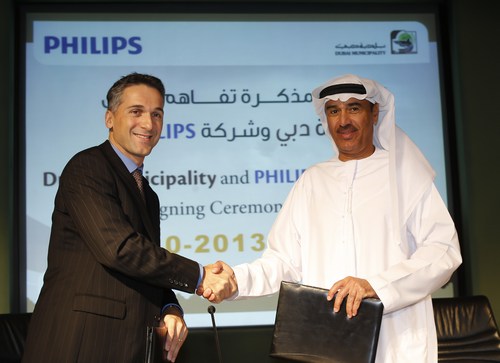Dubai municipality and Philips sign MoU to transform Municipality buildings from conventional to intelligent LED lighting LED lighting can help save 50% of energy consumption and 6,200 tons of CO2 emissions per year in the Municipality’s 262 buildings
In presence of His Excellency Dr. Rashid Ahmed Mohammed Bin Fahad, Minister of Environment and Water, Royal Philips has signed a memorandum of understanding (MoU) today with the Dubai Municipality to support the transformation of the Municipality’s 262 buildings from conventional lighting infrastructure to energy efficient LED based solutions. As part of Dubai Municipality’s long-term vision to build ‘an excellent city that provides the essence of success and comfort of sustainable living’ the LED transformation project will help the municipality to reduce its energy consumption from lighting by more than 50%, leading to lower energy costs and a reduction in its carbon footprint.

"Signing of MoU with Mr. Eric Rondolat, CEO Philips Lighting and Mr. Eng. Hussain Lootah, Director General of Dubai Municipality." (LEDinside/ Philips Lighting)
The agreement was duly signed by Eng. Hussain Nasser Lootah, Director General of Dubai Municipality and Eric Rondolat, CEO, Philips Lighting.
“The Dubai Municipality has pledged to reduce its energy consumption by 20% over the next three years, and we can do so by adopting innovative solutions, such as LED lighting,” said Hussain Nasser Lootah, Director General of Dubai Municipality. “ Becoming more energy efficient will help us protect and sustain our environment for generations to come. We are pleased to take this next step with Philips as they share our vision and have provided a solution that meets the needs of the growing city.”
LED lighting solutions allow for greater control providing the right amount of light where and when it is needed, enabling municipalities to save energy and maintenance costs whilst also making buildings more attractive. Dubai Municipality has the opportunity to save up to 50% or 10.5GWh year on its energy consumption and 6,200 tons of C02 emissions per year, across its 262 buildings when it converts from conventional lighting to LED.
“Philips is proud to partner with the Dubai Municipality, as together we will shape a healthier and more sustainable future for residents in the city,” said Rondolat.
Eng. Lootah reconfirmed the Municipality’s eagerness to keep abreast of global developments in various areas of city administration in line with its sustainability policy in the Emirate of Dubai in the fields of green buildings, the development of the municipality’s strategic vision; and to ensure smooth integration with the strategic plan of Dubai; and comes as part of Dubai Municipality’s long-term vision to build ‘an excellent city that provides the essence of success and comfort of sustainable living’.
The aspiration is to complete the transformation over a three-year period, during which Philips will also provide on-site education and training on implementing energy efficiency projects.





